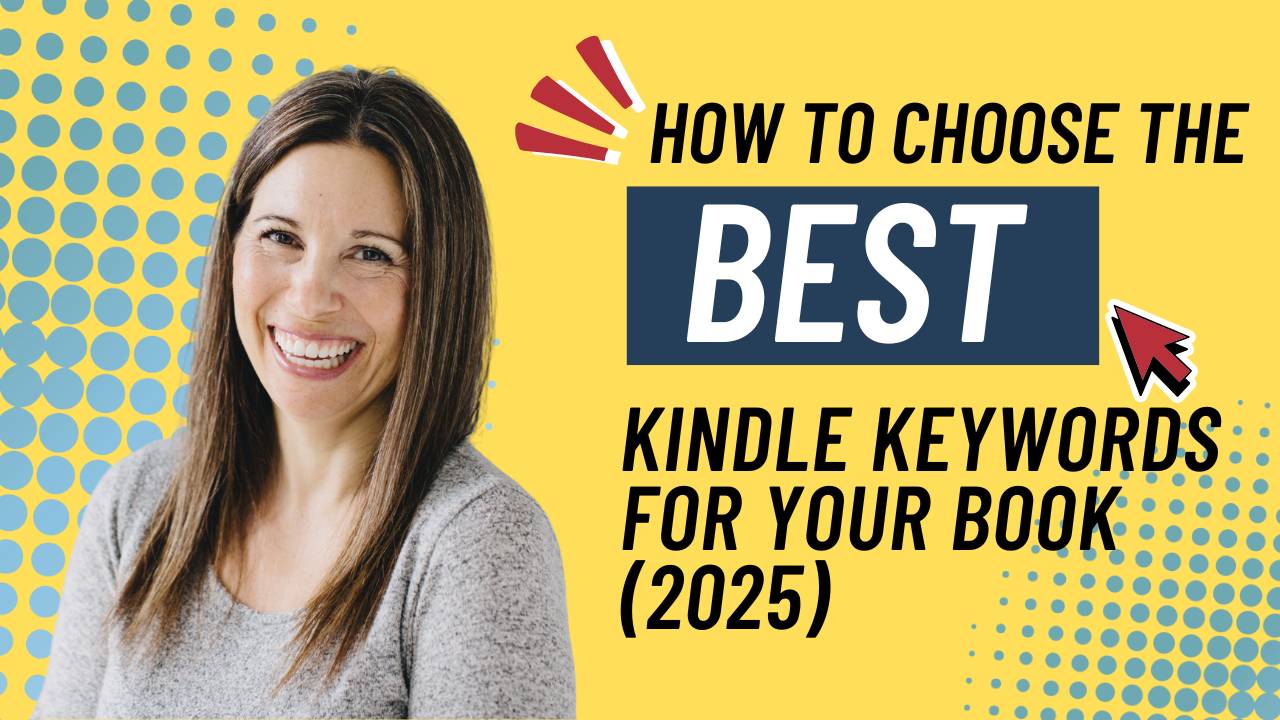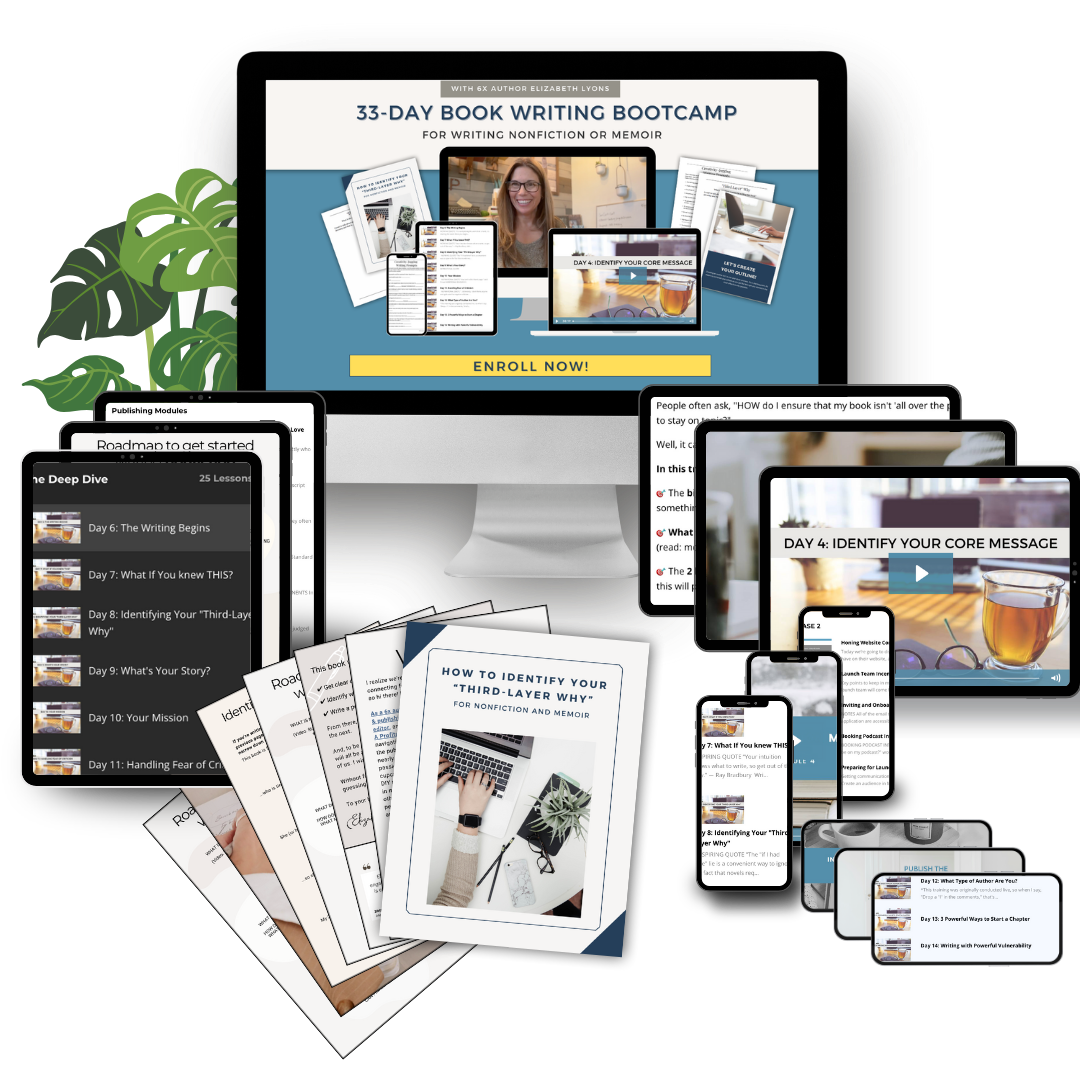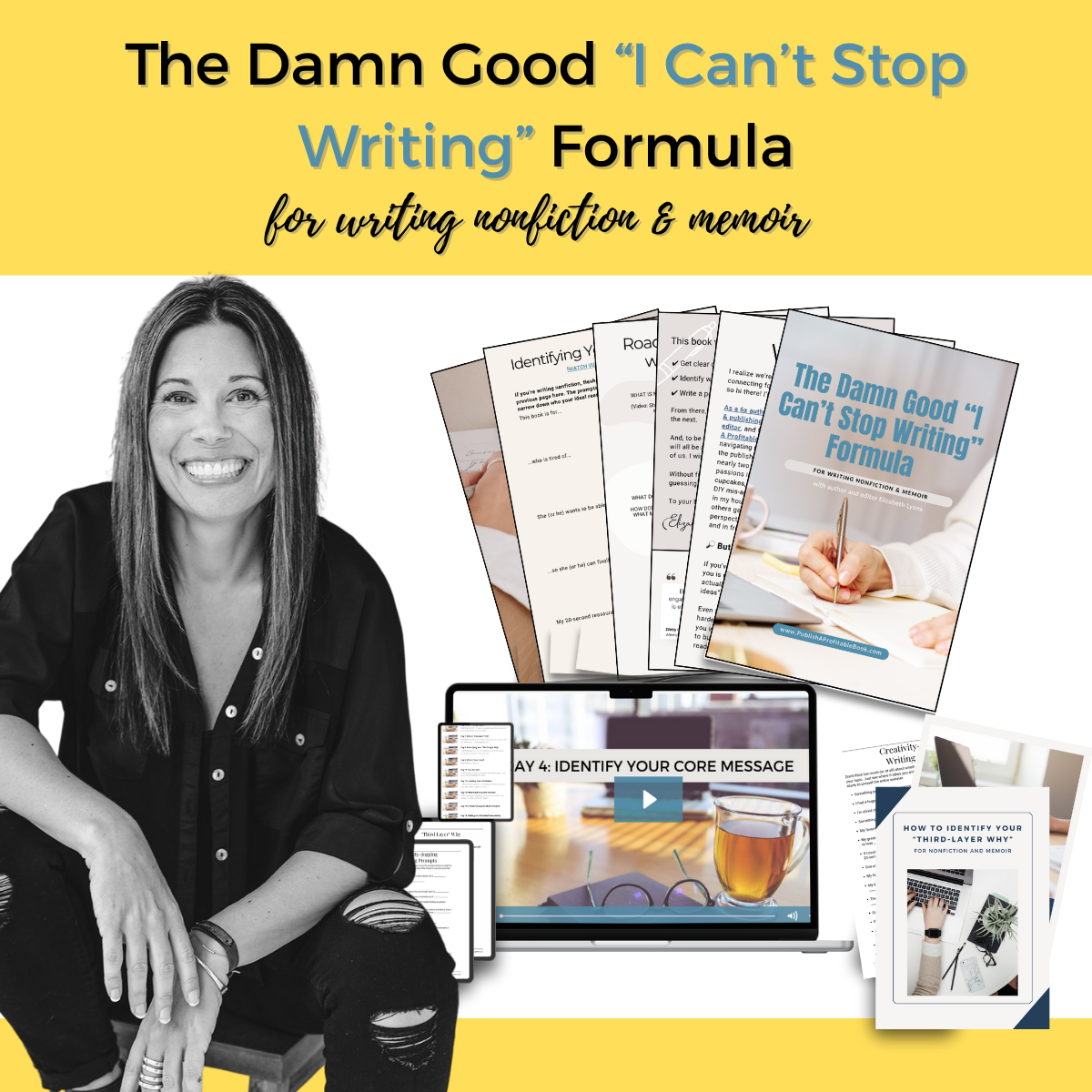Book Writing & Publishing
{The Blog}
Ep 138: How to Choose Best Kindle Keywords for Your Book (Guide for Indie Authors) (2025)

There are more than 42 million books on Amazon right now. So how in the world do you help your book stand out? One word: keywords.
Think of keywords as Amazon’s GPS. They tell the algorithm exactly where your book belongs and who should see it. However, Amazon only gives you seven keyword boxes to work with. Seven! Which means every slot has to pull its weight.
In this episode, I walk you through how to make those keywords work harder for you. We cover:
- Why those “optional” keyword boxes are actually non-negotiable if you want readers to find you.
- The difference between broad, hopelessly crowded terms (like romance or personal growth) and the kind of long-tail keywords that actually connect you to the right readers.
- Simple (and sometimes free) ways to research what your audience is really typing into Amazon.
- Paid (but not ghastly expensive) tools that can save you time if you want to dig deeper.
- How to maximize all 50 characters in each slot.
- The big no-nos: other autho ...
Ep 135: Q&A: Kirkus Reviews, Writing with AI, and Bestseller Status

Ever feel like everyone has some secret book marketing hack? Most of those “shortcuts” are just expensive detours.
In this episode, I’m calling out three distractions that keep indie authors spinning their wheels. First up: Kirkus Reviews. Are they legit? Yes. Are they worth the price for most self-published authors? Maybe. But if you're hoping a $400 review is going to move thousands of copies, well, it probably won't.
Then we dive into the Amazon Bestseller badge obsession.
Finally, we'll talk about AI. As someone who edits A LOT of manuscripts, I can spot AI-generated content from a mile away. So can readers. In publishing, the long game truly is the shortcut.
🎉 NOW OPEN!
Amazon Ads for Indie Authors
Learn how to run Amazon ads that actually work—even if you’ve never touched an ad platform in your life.
👉 CLICK HERE TO JOIN >>
Wanting to get out of your own way so you can write the damn book already?
👉 CLICK HERE to write the first draft of your nonfictio...
Ep 114: Getting Amazon Reviews That Sell More Books (The No-Cringe Guide)

If the thought of asking for Amazon reviews makes you break out in hives, you’re not alone. But here’s the truth: reviews are gold for indie authors. They help boost visibility, credibility, and—most importantly—book sales. The good news? You don’t have to beg, bribe, or feel weird about it.
In this episode, we’re breaking down how indie and self-published authors can ethically and confidently get more Amazon reviews without feeling sleazy or pushy. You’ll discover:
✔️ Why Amazon reviews matter (and how they impact your book’s success)
✔️ Creative, no-pressure ways to ask for reviews that actually work
✔️ The power of social media, email, and direct outreach in gathering reader feedback
✔️ Common mistakes that keep authors stuck (and how to avoid them)
✔️ Real-world examples from indie authors who’ve cracked the code on getting reviews
If you found this episode helpful, don’t forget to follow/subscribe, drop a quick review (see what we did there?), and share it with another w...
Ep 110: ISBN Essentials for Indie Authors

This episode explores the critical role ISBNs play in the self-publishing journey. It's not the most glamorous part of publishing, but understanding the role of the ISBN is critical when it comes to managing book sales and metadata ownership.
Topics covered:
• The importance of ISBNs for indie and self-published authors
• Differences in acquiring ISBNs in various countries
• Components of an ISBN, explained
• Challenges authors may face with hybrid publishers
• Situations where it’s acceptable to use a free ISBN
Resources Mentioned
Kindlepreneur barcode generator
7 Critical Questions to Ask Hybrid Publishers
Dreaming of seeing your book in print but dreading the process?
From cover design to interior formatting to ISBN registration and properly loading your book to distributors, whether you need help with parts of the process or the whole darn thing, I’ve got you covered.
Visit www.publishaprofitablebook.com/self-publishing-services to learn more.
Ep 101: Amazon Ads for Indie Authors

Amazon ads are one of my favorite tools for indie authors to boost book sales and visibility, but they can feel so complicated that it's easy to avoid using them.
I'm sharing key insights from my 12-week "experiment" with a new campaign for my book, Write the Damn Book Already, including targeting relevant keywords and categories, setting appropriate budgets, and monitoring ad performance to optimize results.
MENTIONED RESOURCES:
Original IG post about ads experiment
Link to blog post detailing setup of this ads campaign
Link to Publisher Rocket software
Link to audiobook of Enough: The Simple Path to Everything You Want ($4.99)
Ep 98: Wide vs. Amazon Exclusive: Understanding eBook Distribution Strategies

This episode explores the critical decision of whether to distribute your ebook "wide"—across multiple platforms—or stay exclusive to Amazon through their KDP Select program.
Going wide means your ebook is available on platforms beyond Amazon, such as Kobo or Google Play, giving you access to a broader audience globally. This approach can increase visibility, particularly in countries where Kindle isn't the dominant e-reading platform.
On the other hand, exclusivity with Amazon through KDP Select offers perks like participation in Kindle Unlimited, higher royalties in certain regions, and access to exclusive promotional tools. However, this exclusivity comes with restrictions, including a 90-day lock-in period and the inability to sell your ebook elsewhere, even on your own website.
The right choice depends on your genre, goals, and audience. Romance, mystery, sci-fi, and fantasy often perform well on KDP Select due to the voracious reading habits of their audiences. However, if y...
Ep 97: Offering Pre-Orders as a Self-Published Author

Until somewhat recently, streamlined pre-orders were only possible for traditionally published authors. Now, indie authors can also benefit from pre-orders as well, helping them with:
Building Excitement and Engagement: Pre-orders allow authors to generate buzz and excitement around their upcoming book, encouraging readers to take action before the release date.
Community Building: Offering pre-orders helps authors build and nurture a community by gathering email addresses and establishing a direct connection with readers, which can lead to quicker reviews and word-of-mouth promotion.
Data Collection: Through pre-orders, authors can collect valuable reader data (like email addresses) that is otherwise inaccessible when books are sold through platforms like Amazon. This data allows authors to maintain a relationship with their readers post-purchase and make future marketing efforts more effective.
This episode of Write the Damn Book Already discusses not only the benefits and consi...
Ep 96: How to (Easily) Set Up a Publishing House

Many indie authors find the idea of creating a publishing house overwhelming. But with the right steps, it becomes both manageable and highly beneficial. Here’s why setting up a publishing house is essential and how to do it.
First, it’s crucial to understand that forming a publishing house is not about creating a giant company like Amazon. Instead, it's about legally separating your personal and professional assets. This separation is vital as an author, because it protects your personal finances from any potential legal issues that may arise.
While many creatives shy away from the business aspects of publishing, treating your book as a business can help you reach a broader audience. This means embracing some business tasks (even those you might not enjoy, like accounting. Just me?).
Setting up a publishing house may seem daunting, but it’s simpler than it appears. The key is to create a legal entity, like an LLC, to protect your assets, which isn't nearly as complicated or ex...
What's In A Title (Change)?

Indie authors often wonder whether they can change the title of their book post-publication. Yes, you absolutely can!
You will need a new ISBN, but that's not a terribly big deal. And, because you have a new title and ISBN, you will likely lose all of your online reviews and have to start again.
However, if the possible benefits of the re-title outweigh the downsides, it can be a solid choice.
I chose to retitle my first book (which is about navigating the first year with twins) when I wrote the third edition. For the first and second editions, the title was Ready or Not...Here We Come! But after over a decade (and having written 3 other books), I had more confidence in my own voice, and with updated content and a more authentic voice inside in the book, it made perfect sense to change the overall "vibe" of the book with a new title: Holy Shit...I'm Having Twins!
The book was (and still is) my top-selling book, so I didn't make the shift with a hope of boosting lackluster sales....
Ep 94: WTH is an ISBN?

Click here to check out the Publish A Profitable Book / Publish the Damn Book Already course (currently 25% off with code AUTHOR25).
Click here to access Kindlepreneur's free barcode generator tool.
Understanding the International Standard Book Number (ISBN) is crucial for indie authors. But new authors often wonder what the heck it is and feel a bit "silly" asking!
In short, the ISBN is a unique identifier for books, similar to the UPC for products. It allows books to be easily tracked and purchased globally and enables indie authors' work to be more easily discovered by a larger audience, including libraries, bookstores, and online retailers.
But still, new authors are left with questions such as:
1. Why do I have to have an ISBN?
2. Where do I get them (and how much will they cost?)
3. Should use a free one from Amazon/KDP?
4. Do I only need one for each book?
5. Does an ISBN provide copyright protection?
This episode clears it right up!









